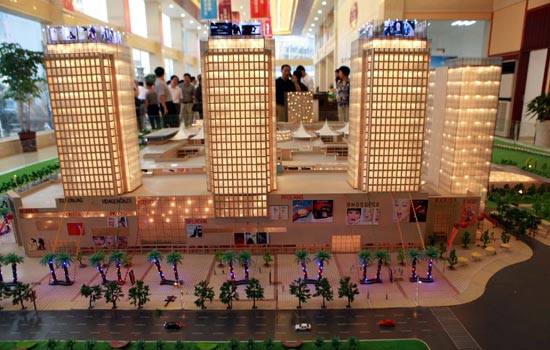|
 |
|
Building models at a property fair in Jiujiang, Jiangxi province, on May 16. A number of recent commercial real estate deals with astounding bid prices suggest that developers are becoming more confident about the property market. [Photo/China Daily] |
Concerns emerge that money making its way into property market to gain quick returns may lead to burst of bubble
A number of recent commercial real estate deals with astounding bid prices suggest that developers are gaining confidence but are also giving rise to concerns that the money pouring into commercial property in search of a quick return will burst a bubble.
On June 18, the Chinese property developer Evergrande Real Estate Group Ltd set a record for land prices in Guangzhou when it bought a plot for the equivalent of 32,9687 yuan ($5,184) per square meter.
Evergrande's 1.32 billion yuan bid price for the plot, 800 million yuan higher than the starting price, dazzled the industry and public, especially at a time when most Chinese real estate developers are cash-strapped because of a tight housing sale policy Beijing adopted last year.
Evergrande is not alone in pouring money into commercial property.
Shanghai Wanzhuo Investment Co Ltd paid 175 million yuan in early June for a parcel in Jiading New Town. The per-sq-m price equaled 16,063 yuan, 435 percent of the starting price.
The last deal with a spillover price exceeding 400 percent occurred more than two years ago, when China's real estate market was at its peak of expansion.
This month has seen not only an upsurge in residential sales, but also a comeback in developers' enthusiasm for commercial property. Beijing, Guangzhou, Shanghai and second-tier cities such as Chengdu and Tianjin all have seen commercial property deals with high spillover prices.
Analysts said developers' revived confidence explains this new round of enthusiasm. In Beijing, 10,576 registered house purchases were made in the first half of June, a 46.5 percent year-on-year increase, according to the Beijing Municipal Housing and Urban-Rural Development Bureau.
Xue Jianxiong, an analyst with China Real Estate Information Corp, said the past freeze caused land prices to plummet, stimulating developers to hunt for bargains.
Another influence is the local government, according to Zhang Dawei, an analyst with Centaline Property.
"The current tight controls on residential housing have depressed the price of land for such projects. This made local governments more willing to sell land for commercial purposes," Zhang said.
"Combined with the more generous credit support in this sector, we have found a renewed zeal for commercial property."
But experts on commercial property warned the flash money pouring into this sector - as many investors who are less experienced in the sector seeking fast returns - could mean a disaster for commercial property.
"With so many residential developers who have little understanding of commercial property rushing in, raging competition is on the horizon," Shen Guojun, chairman and CEO of China Yintai investment company, told Sina.com.
Yintai's past investments concentrated on commercial property.
"The value of commercial real estate lies not in building, but in management," Shen said. "If it is managed well, it can be a lasting blessing. But if not, it can be a burden or even junk."
Wang Shaoshan, secretary-general of the China Commercial Real Estate Association, agreed.
"Unlike residential property, which can bring fast returns, the value of commercial real estate can be realized only by a gradual increase in rent through careful management. But a lot of developers now rely on one-off sales," he said.
An earlier industry report by Sina.com showed that the top 20 Chinese developers, most concentrating on residential property development, all have ventured into commercial property.
The latest report by CBRE, a property consultancy firm, said the oversupply of commercial property indicated a bubble is surfacing. In China's second-tier cities, it could take 15 to even 60 years in extreme cases to sell existing projects.
Shen said three years from now the commercial property market might be more miserable than the residential housing market.
But some experts said the overcapacity occurred only in second- and third-tier cities. There should be no reason to worry about the market in major cities like Beijing and Shanghai.
"In Beijing, the vacancy rate in office buildings is zero. The demand still outnumbers the supply, and there is plenty of room for price growth," Zhang said.
zhengyangpeng@chinadaily.com.cn
